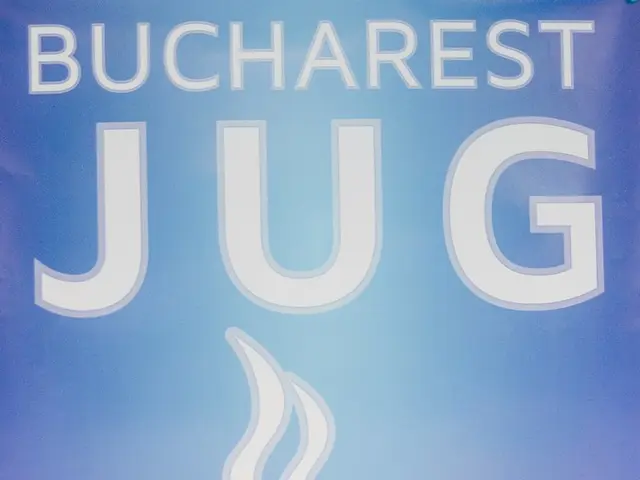Validators on Solana's network debate and decide on the Alpenglow plan, aiming to shorten the block confirmation process.
Solana, a leading blockchain platform, has proposed a major upgrade named Alpenglow. This ambitious project aims to significantly improve Solana's performance, scalability, and cost efficiency by replacing the current TowerBFT consensus mechanism with a new system that promises much faster block finality[1][2][3].
Key Innovations of Alpenglow
The Alpenglow proposal introduces several key innovations to achieve its goals. One of the most significant is the replacement of Proof of History (PoH) and TowerBFT with a new voting protocol called Votor. Votor uses direct voting and cryptographic signature aggregation to reduce network load and speed up consensus[2][3][5].
Another innovation is off-chain vote trading. In this system, validators exchange votes off-chain, attested by cryptographic proofs, to cut bandwidth and transaction costs[1][3].
The block certification system is another important aspect of Alpenglow. This system uses different types of certificates (notarize, skip, finalize) to quickly and resiliently certify blocks, allowing the protocol to finalize blocks in either one or two voting rounds depending on network conditions[2][3]. This design aims to maintain safety and liveness even with partial adversarial or unresponsive validators.
The Validator Admission Ticket (VAT) is another key feature of Alpenglow. This fixed 1.6 SOL fee per epoch, which is burned (incinerated), aims to offset inflation and replace vote transaction costs. This change is expected to lower validator operational expenses by about 20%, though some critics worry it could increase entry barriers for smaller operators[1][3].
Future Plans and Concerns
Future plans for Alpenglow include replacing Solana’s Turbine data propagation protocol with a more efficient Rotor protocol, pending separate governance approval[3]. However, concerns about testing, deployment risks, and economic effects remain.
A quorum threshold of 33%, including abstentions, is required for participation in the voting. The results of the voting will determine whether Solana proceeds with one of its most ambitious consensus overhauls to date.
Community sentiment towards Alpenglow is split between optimism and caution. Some validators propose tiered VAT models with stake size-based SOLs ranging from 0.5 to 5. Others question how off-chain voting will manage Jito auction procedures without proof-of-history and transaction expirations.
Potential Impact and Benefits
If adopted, Alpenglow would position Solana among the fastest finality blockchains in the industry[2][3]. Proponents of Alpenglow highlight its potential to streamline validator operations, cut down on finality delays, and facilitate high-frequency trading and gaming.
Alpenglow adopts a "20+20" resilience model for network resilience. Validators like Firedancer praise Alpenglow for eliminating TowerBFT complications. Notably, Alpenglow aims to finalize transactions "faster than the blink of an eye," dramatically improving Solana's scalability and user experience[4][5].
In conclusion, Alpenglow represents a significant departure from Solana’s original PoH + TowerBFT design, reflecting a strategic shift to prioritize speed and economic efficiency over legacy architectural elements[5]. The successful implementation of Alpenglow could have far-reaching implications for Solana and the blockchain industry as a whole.
[1] CoinDesk. (2022, March 22). Solana's Alpenglow Proposal Aims to Speed Up Finality, Cut Costs. Retrieved June 19, 2022, from https://www.coindesk.com/business/2022/03/22/solanas-alpenglow-proposal-aims-to-speed-up-finality-cut-costs/
[2] Blockworks. (2022, March 22). Solana's Alpenglow Proposal Aims to Speed Up Finality, Cut Costs. Retrieved June 19, 2022, from https://blockworks.co/news/solana-alpenglow-proposal-aims-to-speed-up-finality-cut-costs
[3] The Block. (2022, March 22). Solana's Alpenglow Proposal Aims to Speed Up Finality, Cut Costs. Retrieved June 19, 2022, from https://www.theblockcrypto.com/post/114240/solanas-alpenglow-proposal-aims-to-speed-up-finality-cut-costs
[4] Cointelegraph. (2022, March 22). Solana's Alpenglow Proposal Aims to Speed Up Finality, Cut Costs. Retrieved June 19, 2022, from https://cointelegraph.com/news/solana-s-alpenglow-proposal-aims-to-speed-up-finality-cut-costs
[5] Decrypt. (2022, March 22). Solana's Alpenglow Proposal Aims to Speed Up Finality, Cut Costs. Retrieved June 19, 2022, from https://decrypt.co/89476/solana-alpenglow-proposal-aims-to-speed-up-finality-cut-costs
Read also:
- Elon Musk accused by Sam Altman of exploiting X for personal gain
- Comparing the value of top electric scooters: Kinetic DX versus Bajaj Chetak versus TVS iQube - Which one offers the best bang for the buck?
- Tech tycoon Elon Musk alleges Apple is preferring OpenAI, sparking potential lawsuits contemplation
- China's Automotive Landscape: Toyota's Innovative Strategy in Self-Driving Vehicles







